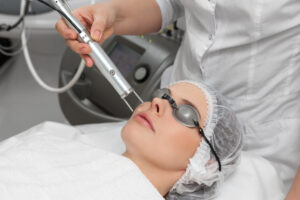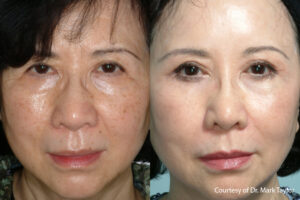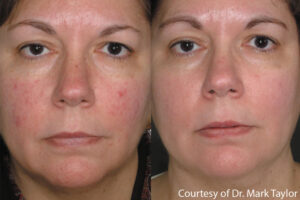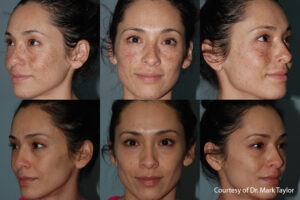Photofacials / Intense Pulsed Light with Lumecca
 Photofacials use intense pulsed light (IPL) to repair signs of skin damage, including red marks, enlarged thread veins, and brown spots. When done repeatedly, they can also help reduce the appearance of fine lines and wrinkles, minimise pore size, and stimulate collagen production.
Photofacials use intense pulsed light (IPL) to repair signs of skin damage, including red marks, enlarged thread veins, and brown spots. When done repeatedly, they can also help reduce the appearance of fine lines and wrinkles, minimise pore size, and stimulate collagen production.
It has now been well demonstrated that regular, repeated, and gentle sessions of intense pulsed light over the years can result in the skin looking younger many years later. This is considered to be due to the stimulation of collagen, and it has been shown that regular treatments with IPL can cause the skin to express the same genes as much younger skin. This is thought to be the result of the treatment’s ability to boost collagen production, which can promote increased skin elasticity and hydration.
What is Intense Pulsed Light (IPL) and how does it differ from laser treatments?
Intense pulsed light (IPL) is a technology that filters pulsating light into different wavelengths for skin treatment. This means that IPL offers several different wavelengths of light, in contrast to lasers which typically only have one very specific wavelength. The original IPLs that were built in the 1990s were developed as a cheaper alternative to lasers for practitioners who could not afford the more powerful and specific lasers. As the colour filters allowed several colours, this meant that one machine could be used to treat several different problems (e.g. red blood vessels, pigmentation, and unwanted hair) rather than having to buy a separate expensive laser for each problem. On the other hand, having several colours could also be a disadvantage, as it meant the IPLs had a higher risk of heating structures which were not the intended target (e.g. heating the normal pigment in the surface of the skin, causing a burn). Also, the earliest IPL machines were not very powerful and produced only mild results compared to lasers.
However, over the last couple of decades, the engineering behind some IPL companies has improved significantly and there are now certain brands making more powerful IPLs with more selective filters. This has increased the effectiveness of treatment while also making it safer and gentler on the skin.
What Can an IPL Photofacial Treat?
IPL is a versatile treatment that is able to address a broad range of skin problems, including:
- Fine lines and wrinkles
- Brown spots and hyperpigmentation
- Unwanted hair
- Birthmarks
- Acne-related discolouration and scarring
- Sun damage
- Rosacea
- Enlarged veins and blood vessels
- Age spots
Our dermatologist will discuss your treatment goals with you prior to your first session in order to evaluate whether IPL can adequately address your needs. In some cases, she may recommend an alternative procedure, such as laser hair removal, to better target specific concerns.
What system of IPL is used at Dermatology Consulting?
Our dermatologist uses the Lumecca™ IPL, which is one of the latest IPLs and which has significantly more power and more specific colour filters than many other IPLs. It is at least three times power and more specific colour filters than many other systems, and it is notable for its enhanced efficacy in treating red and brown pigmentation.
Two distinct advantages of the Lumecca™ system are that it treats both red and brown spots at the same time and it covers large areas quickly.
Click Here to Download Lumecca™ Brochure
How Should You Prepare for an IPL Photofacial Treatment?
It is important to avoid excessive sun exposure and tanning before the treatment. If you are prone to the cold sore virus, it is often helpful to take antiviral tablets both before treatment and for five to seven days afterwards to prevent a cold sore flare-up.
What Does an IPL Photofacial Treatment Involve?
Makeup is removed and a soothing ultrasound gel will be applied to the face. Protective goggles are worn to prevent the IPL flashes from going into the eyes. Special goggles are worn to protect the eyes during treatment. The IPL has a cool sapphire tip which is designed to cool the skin and protect it from overheating. Many patients describe the sensation of IPL treatment as a gentle flash of mild heat against the skin. The cool tip is moved steadily across the treatment area to cover it evenly. Treatment of a full face usually takes approximately 10-15 minutes. It is very important not to have a tan, as the IPL cannot differentiate between the targeted pigment and the tanned skin. This can negatively impact treatment results and even increase the risk of skin irritation.
What Does the Skin Look Like After an IPL Photofacial?
After treatment, the skin often looks slightly flushed. This effect typically lasts about 10-30 minutes. Brown spots may look slightly darker and form mild crusts, which should flake off over a few days as the pigment is expelled. You can apply makeup immediately, if desired, and continue with your daily activities.
What is the Recovery Period Like for an IPL Photofacial?
You can wash, swim and otherwise continue your daily activities normally after a photofacial. However, it is recommended that you avoid excessive sun exposure and/or tanning for a few weeks after treatment.
How Often Can You Have an IPL Photofacial?
The photofacial treatment can be performed every two to four weeks until you have achieved the results you are looking for. After that, the treatment can be performed once or twice a year to maintain results. When done repeatedly, IPL treatments can stimulate production of new collagen while also improving the appearance of fine lines and skin texture. The end result is typically younger, more even-looking skin.
How Much Does an IPL Photofacial Cost?
The precise cost of IPL treatment will vary based on a few different factors, including how many areas are being treated and the size of the treatment area(s).
If you would like to learn more about IPL treatment or are interested in booking a session, please contact us today.




